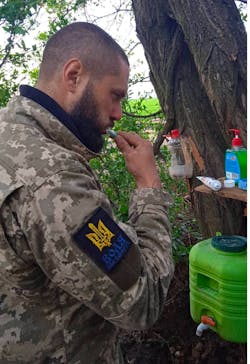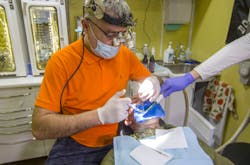Oral care during war: From the front lines of Ukraine
Life in the war trenches is a harsh and significant hardship. Active-duty military personnel live underground, construct their own necessities, and combine war skills with everyday savvy. A rest place is a dugout where soldiers sleep and keep the wounded before their evacuation. Meals are inconsistent and arrive at the frontline only after a ceasefire. Washing areas are nearly primitive, and water supplies are scarce. Stress, non-nutritious meals, and unsanitary conditions impact medical issues, including dental diseases and oral health. Here’s what Ukrainian soldiers are facing.
Wartime accommodations
In the field, trenches are for fighting and hiding, and blindages are for resting and healing. Warriors must spend a substantial amount of time underground in cold, damp, dirty conditions. Wooden racks and warm blankets are a luxury. In the urban areas, soldiers sleep in abandoned buildings on the floor or wherever it's feasible. According to Ukrainian military dentist Valeriy Gorbenko, residing in places and circumstances where it's impossible to stay healthy leads to stress, the first and foremost cause of any disease, including dental.
Lack of nutrition
During the first weeks of the war, the Ukrainian soldiers were, and in some areas still are, being fed by local civilians such as restaurant owners and residents of the towns. A significant part of the Ukrainian Army (ZSU) is made up of volunteers and random people who changed their casual attire into a military uniform and joined their local territorial defense (TRO).
Neighbors supported neighbors, providing everything: food, clothes, medications, and tons of snacks. Energy bars and drinks are almost nonperishable, compact, and quickly satisfying, and while frequent snacking wins the battle with hunger, it loses the war with caries. The pH level of energy drinks is 2 to 3, which corrodes the stomach and erodes the enamel. Non-nutritive frequent snacking and energy drinks are the soldiers’ second enemy on the frontline.
Unhygienic conditions
Hygiene is a colossal problem for every soldier. There is no place to wash, clean, or brush, whether in the forest or buildings. Soldiers wear the same clothes for many days. Since water is scarce, it’s saved for hydrating. Washing and laundering are available during a leave when soldiers may go into the nearest town. Wet wipes are life savers. But with summer coming, fungal infections are anticipated to surpass already common trench diseases such as pneumonia and all types of infections.
Hard to maintain dental hygiene
Ukrainian soldiers try to do their best to stay healthy despite their misfortunes, but it's difficult. All comfortable, reliable, and expansive dental hygiene equipment, such as power brushes or interdental aids, had to be left at home. Old-fashioned manual toothbrushes remain the only realistic tools for them to keep up with daily oral health. A compact brush is ideal, but these get lost often due to constant relocations and explosions. The low toothbrushing rate during wartime can make even seasoned hygienists grieve.
The incidence of periodontitis or caries is classified information comparable to the mortality or captivity rates. But the fact that much of the current Ukrainian Army personnel consists of civilians speaks to the urgency of mobilization and the unpreparedness of the recruits. In just one day, journalists, plumbers, and auto dealership owners were turned into warriors, and some of them were in the middle of dental treatment, for instance, endodontic therapy, which means the soldier fights on with the exposed nerve and while on painkillers. And it's not easy to leave the military checkpoint for medical help.
More patient care articles
Anxiety in children: What dental professionals should look for, and how they can help
Gut health: How important is the food you eat?
Constant life-threatening conditions, such as artillery or air attacks and ruined infrastructure in nearby villages, don’t help in their search for a dental office. The nearest city, Dnipro, with a more or less normal operating dental business, is 230 km (143 miles) away from the frontline. It’s very complicated to get a tooth repaired, but possible. Serhii Prozheiko, a dentist from Kyiv, served in his local TRO during the first weeks of the war and helps Ukrainian defenders. “I take no payments from soldiers. My charity fund, Smile Ukraine, was founded to help Ukrainian heroes keep their teeth healthy,” says Prozheiko.
The only hope for urgent dental therapy in a military position is a doctor who is a fellow serviceman. Dmytro Ivanyuk, a former dental lab technician, admits his battalion is lucky to have an oral surgeon in their ranks. During noncombatant days, dental professionals treat the soldiers for acute dental pain or caries, extract teeth, and even plan on doing implants when they’re able.
All of this has a chance due to outstanding interpersonal cooperation. A local dentist in a nearby village lent his space with a dental unit and autoclave. A surgeon-soldier arrived to defend Ukraine with his own surgical instruments. Generous people donated money to purchase necessary equipment for successful oral surgery. Such inspiring stories exist, but they’re rare. Most Ukrainian Army servicemen must rely on their self-provision and prevention.
Power brushes, floss, or mouth irrigators can be seen in soldier’s hands. However, due to wartime conditions, dental hygiene in the trenches remains simple: an inexpensive toothbrush and toothpaste. Aleksandr Kurbatov, a journalist and these days a soldier, said that last month his battalion changed their location eight times. Eight toothbrushes a month is a somber reality. But since toothbrushes are not provided quickly, charities and families fill the gap between an official provision delivery and the real needs.
Massive stress, inconsistent nutritious meals, frequent snacking and energy drinks, unsanitary field conditions, and scarce hygiene tools lead to deterioration of soldiers' health. The common cold, pneumonia, and different infections blitzed the soldiers during the first weeks of service. Dental infections were no exception. Dental pain, gingivitis, and complaints of overall “damaged teeth” are common among servicemen. Unfortunately, dental needs are not always met on the battlefield. Military dentistry in Ukraine is not ubiquitous; it’s actively evolving. Volunteer dentistry, as part of a widespread volunteer movement in Ukraine, is common and gaining momentum. The combination of both is anticipated to improve access to prevention, care, and the quality of treatments.
Author’s note: I would like to express my sincere gratitude to Dr. Noenko, Dr. Gorbenko, and Dr. Prozheiko, who helped gather the necessary information for the article, and to Dmytro Ivanyuk and Aleksandr Kurbatov, who are defending Ukraine and helping soldiers stay healthy.
About the Author
Anna Filonenko, BS, RDH
Anna Filonenko, BS, RDH, has five-plus years of experience as an oral health-care provider. She practices in Illinois full-time at the Navy RTC and part-time at a private practice, where she specializes in patients with autism. She is currently involved in the volunteer movement for Ukraine. She can be reached at [email protected].


